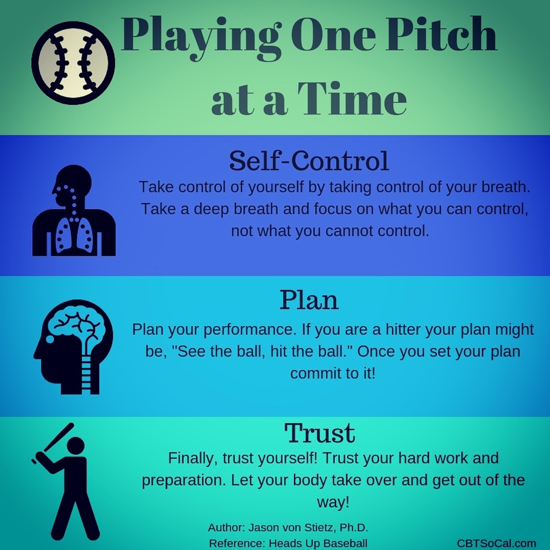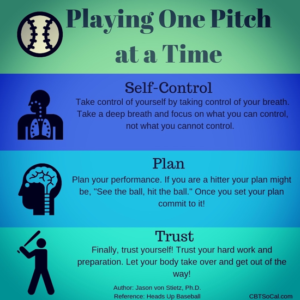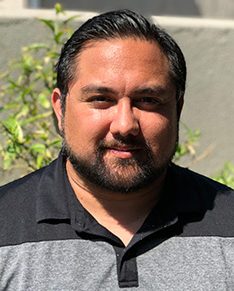Mental Toughness Tips #2: Playing One Pitch at a Time

When I was a sport psychology intern at the Major League Baseball Youth Academy (MLBYA) in Compton, I had the amazing opportunity to work with high school and college baseball players from all across the country. Some of the athletes were high performers, who went on to be drafted to the big leagues, while others might have struggled to see playing time on their local teams.
As a sport psychology intern, my job was to teach them mental skills that they could use to take their baseball performance to the next level. However, the great thing about mental skills is that their usage is not confined to sport. As many former athletes contend, the skills you learn in sport will benefit you long after your playing days are over.
During my time at the MLBYA, I was introduced to the book Heads Up Baseball by the now late Ken Ravizza. Ravizza was a pioneer in the field of sport psychology and we used his book as a manual.
What many sport psychologists, high performers, and everyday people on a path of self-improvement are currently calling mindfulness, Ravizza called playing one pitch at a time.
He pointed out that ballplayers often get stuck thinking about the mistakes they made a few pitches ago, and are not fully focused on the pitch about to be thrown right now. To illustrate his point, if a player was stuck thinking about his mistakes from a previous pitch, he would ask him to hold two baseballs in his hand and throw them both with perfect accuracy. It’s as good as impossible. If a player is stuck reliving his mistakes from a previous pitch, then he is not focused on the needs of the present moment, and it will show in his performance.
So, how did players rectify this? His solution was simple. He helped ballplayers to play one pitch at a time by doing three simple things:
Step 1) Practice self-control.
Step 2) Have a plan.
Step 3) Trust the plan.

Although Ravizza’s strategy is simple and effective, it is easier said than done. In the upcoming articles, we will discuss how you can follow Ravizza’s simple strategy to improve your performance not just in sport but in all areas of life. Before Ravizza passed away, he often noted that retired professional athletes would often tell him that although they used the skills he taught them in their sport, they used them for more often in their daily lives.

Author Dr. Jason von Stietz specializes in Cognitive Behavior Therapy and Sport/Performance Psychology in Torrance, CA. He is available for a free initial phone consultation. Dr. von Stietz works with individuals from Long Beach, the greater Los Angeles area, and the South Bay including Palos Verdes, Redondo Beach, Hermosa Beach, Manhattan Beach, and El Segundo.




